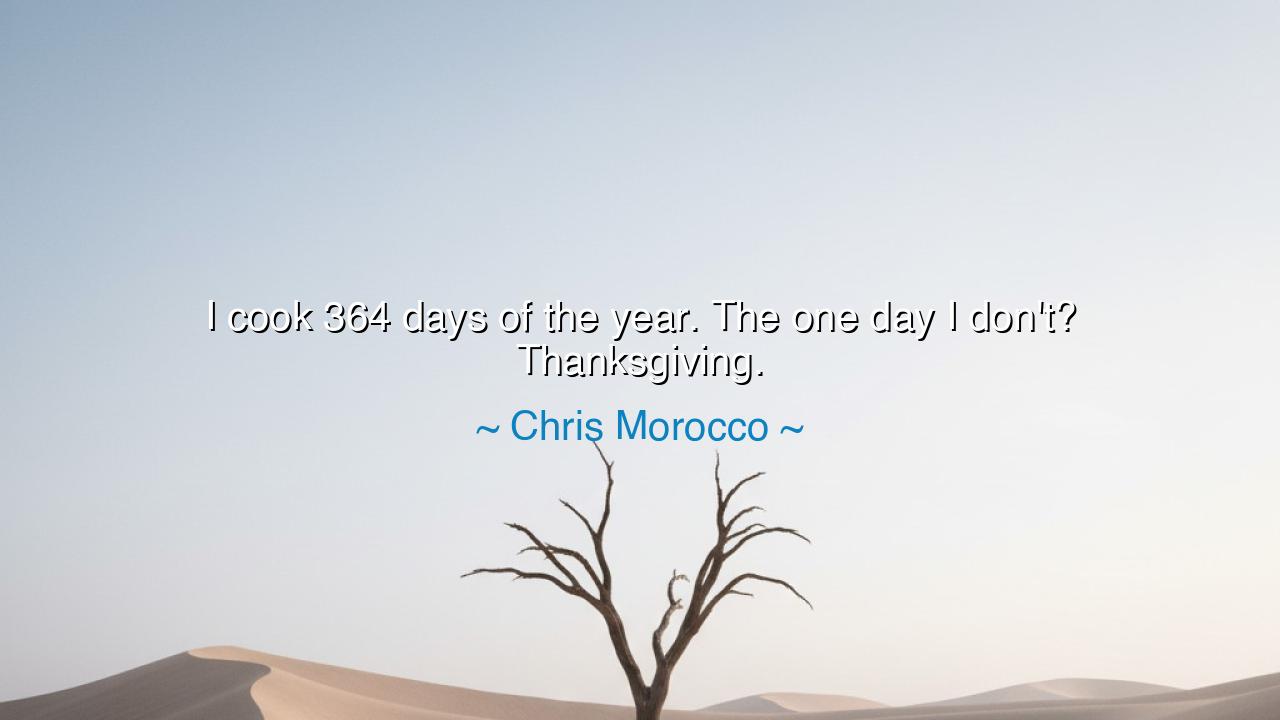
I cook 364 days of the year. The one day I don't? Thanksgiving.






In the words of Chris Morocco: “I cook 364 days of the year. The one day I don’t? Thanksgiving.” At first, these words may sound playful, a simple jest from one who labors daily over fire and pan. Yet beneath them lies a deeper truth, one that speaks of rest, humility, and the sharing of burdens. For even the master of a craft must sometimes step aside, and even the most faithful laborer deserves a moment to simply receive. Thanksgiving—a day devoted to abundance and gratitude—becomes for him not a day of toil, but of surrender.
The ancients understood the sacred rhythm of work and rest. The Hebrew people had their Sabbath, when no hand was raised in labor and all were called to dwell in peace. The Romans, too, had their feast days, when the fields lay still and the hearths were filled with celebration. To set aside labor, even for a day, was not weakness but wisdom: for the body renews itself, the spirit finds balance, and one learns again the joy of community without the weight of constant striving. Morocco’s words echo this wisdom—that sometimes the highest form of discipline is not to work, but to rest.
There is also humility in his declaration. A man who cooks nearly every day is no stranger to responsibility, yet on Thanksgiving he entrusts the task to others. This is a lesson of trust and gratitude: to allow someone else to serve, to receive without guilt, to recognize that feasting is not only about what we bring to the table, but also about what we accept from others. In this way, Thanksgiving becomes not only a day of giving thanks for food, but a day of honoring the bonds of family and friendship through shared responsibility.
History, too, gives us many examples of this truth. Consider the tale of Cincinnatus, the Roman farmer called to lead his people in time of war. After victory, he did not cling to power but returned to his plow, choosing simplicity over ceaseless labor. His story reveals the nobility of stepping aside, of knowing when to act and when to rest. Morocco’s words hold a similar spirit: that to let go, to cease labor even for a single day, is not to diminish oneself, but to enrich the meaning of the moment.
There is also hidden wisdom here about the dangers of constant work. To cook every day without pause is a triumph of discipline, but it can become a burden if never relieved. By laying down his tools on Thanksgiving, Morocco reminds us that joy is not only in creating, but also in participating. Rest is not an escape from duty but an essential part of it, ensuring that the heart remains open, grateful, and whole.
The lesson is clear: do not fear to rest, nor to share burdens. Even in the things we love most, there is wisdom in stepping back. For gratitude is found not only in doing, but in being—in sitting at the table, in receiving from others, in rejoicing as part of a whole. The true spirit of Thanksgiving is not in the labor of one, but in the fellowship of many.
Practical action lies close at hand. If you are one who always serves, allow yourself to be served. If you are one who labors without pause, grant yourself the gift of rest, at least on sacred days. Share the work, invite others into the labor, and discover that in community, joy multiplies. For even the strongest hands need time to be empty, and even the most tireless hearts need time to be still.
Thus, Morocco’s words shine with ancient wisdom: the one who cooks every day chooses not to on Thanksgiving, for it is a day when labor gives way to gratitude, and work bows before the feast of fellowship. In this surrender is not weakness, but strength, and in that pause is the very heart of the holiday.






AAdministratorAdministrator
Welcome, honored guests. Please leave a comment, we will respond soon